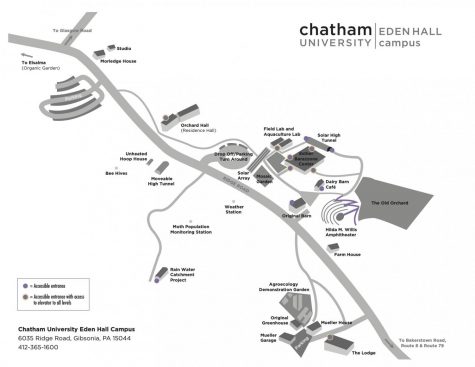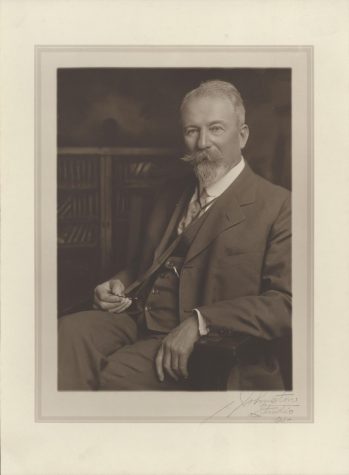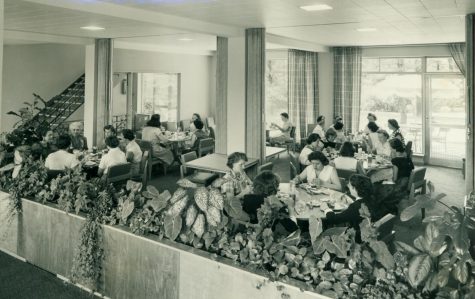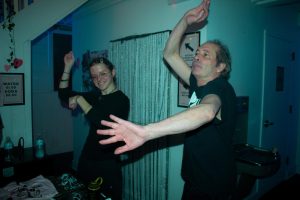Eden Hall’s unique history: A vacation destination for working women
April 13, 2021
Physically disconnected from main campus by a 45-minute drive, Chatham University’s 388-acre Eden Hall campus is located in the rural woodlands of Richland Township. Eden Hall is home to the Falk School of Sustainability and is outfitted with Earth-conscious amenities such as an onsite wastewater treatment operation, geothermal heating systems, 400 solar panels and a certified organic farm.

But, it hasn’t always been that way.
Stacey Enck, facilities manager at Eden Hall, has been there for 13 years.
“When I started, none of the new buildings were here at all,” she said. “Other buildings in bad condition were taken down. There was a blacksmith shop, poultry processing building, a shed row with stables, a house,” all in dilapidated conditions.
Eden Hall’s history, like Chatham’s, is one that is centered around a commitment toward women. Prior to being a satellite campus of Chatham, Eden Hall was a vacation destination for the working women of western Pennsylvania.
The idea of creating a destination for working women came from the original owner of Eden Hall, Sebastian Mueller. Mueller had travelled to America from Germany to help his cousin, Henry J. Heinz, with his food processing business in 1884.
While working at The H.J. Heinz Company, Mueller fell in love with Heinz’s sister, Elizabeth, and was married in 1888, according to the Eden Hall Foundation. The couple had three children together: Elsa, Alma and Stanford. Elsa and Alma died as infants from a bacterial infection, and Stanford died at 18 from scarlet fever.
Beginning in 1912, Mueller began to purchase land in Richland Township to create this eventual vacation destination. At the time of his death in 1938, Mueller had acquired more than 400 acres of land, according to resources in Chatham’s Archives.

Mueller wanted “to maintain a vacation home where working girls and women of proper character may go from time to time for the purpose of enjoying a vacation and obtaining rest and recreation,” as outlined in his will. To operate this home, Mueller appointed trustees and created the Eden Hall Foundation.
Vacation at Eden Hall was originally only offered to female Heinz employees, but, after attendance dropped off, working women from other companies could be invited and accompany Heinz employees.
Former Chatham president Esther Barazzone, Ph.D., heard a rumor that the Eden Hall Foundation was thinking of selling its land in 2007. As luck would have it, the Eden Hall Foundation was simultaneously looking to Chatham as a suitable buyer.
Chatham received Eden Hall during the 2008 Recession, according to Barazzone.
“We viewed it as a chance to turn Chatham from a regional institution to a national institution,” she said.
“I was extremely proud of the Board [of Trustees],” she continued, “because they decided, as the U.S. economy crashed, as our endowment dropped by 3-some percent, and as we bought Eastside, they decided that … we would create an exemplary school for sustainability.”
Eden Hall campus opened to students in 2015. The addition of 388 acres has made Chatham the largest academic landowner in Allegheny County, larger than schools like Carnegie Mellon University and the University of Pittsburgh, according to Barazzone.
Lois Claus, 85, stayed at Eden Hall for the first time in 1953 when she worked as a secretary at H.J. Heinz Company. “I thought it was fabulous at that time. In those days growing up, we didn’t travel very far,” Claus said. “I had never been anywhere like that … it was like a resort.”

Heinz employees would reserve a weekend to go up to Eden Hall, and they spent the weekend riding horses, playing ping pong, enjoying the jukebox and bowling in the Lodge’s basement.
“It didn’t cost anything,” Claus said. “The bus came after quitting time on Friday, and the bus would bring us back on Sunday afternoon.”
Women could also stay at Eden Hall if they were healing from operations, free of charge, and the cost of their surgeries paid for by the foundation.
Aspects of Eden Hall’s history are still evident on campus. The road that travels through campus, Ridge Road, serves as a line between the old and the new. Across the street from the dining hall, students can visit Sebastian Mueller’s old house and the Lodge. At the Lodge, students can visit the swimming pool and bowling alley once used by guests.
Further down the road, students can visit Chatham’s organic farm, Elsama, that was named after Mueller’s daughters.
“There is history with this land,” Eden Hall resident Annon Ball ’23 said. In order to pursue sustainability and maintain Eden Hall’s history, Annon believes that there needs to be more community engagement, and that students and professors need more resources.
According to Enck, the historical buildings are here to stay. While there are no definite plans, she believes that Chatham would prefer to renovate the buildings rather than get rid of them.
“I had this fantasy that one room in the Lodge could be made into a working women’s museum for Pittsburgh, which… I still think would be a great idea,” Barazzone said. “I don’t think that part of [Eden Hall] has been preserved, except in the retelling of its story, and that’s too bad.
“I’m very happy to see that President Finegold has embraced and continues the main missions of [Chatham],” Barazzone continued. “The commitment to sustainability, to globalism, to women’s leadership, to civic engagement … I do hope that continues.”








Carole Defilippi • May 17, 2023 at 4:54 pm
I worked as a secretary at Heinz, Pittsburgh, during the 1960’s and spent several weekends at Eden Hall. It was quite an enjoyable experience to be pampered by the staff! I have often wondered what happened to this place. The picture of the dining room in the article brought back many fond memories. Are visitors welcome?
Norma Jacqueline Young/Dunmore • Jul 28, 2022 at 10:40 pm
I worked for H.J.Heinz Company, Leamington, Ontario, Canada from 1955 – 1960 as a secretary! All female employees could stay @ Eden Hall Farm, free of charge! We just had to pay our own airfare from Detroit to Pittsburgh- the staff picked us up @ Airport & took us back to catch our plane back to Detroit, usually after a weekend stay! Heinz staff always took us on a tour of the H.J. Heinz Plant and everything was absolutely free! Lucky ladies! Thank you to everyone.